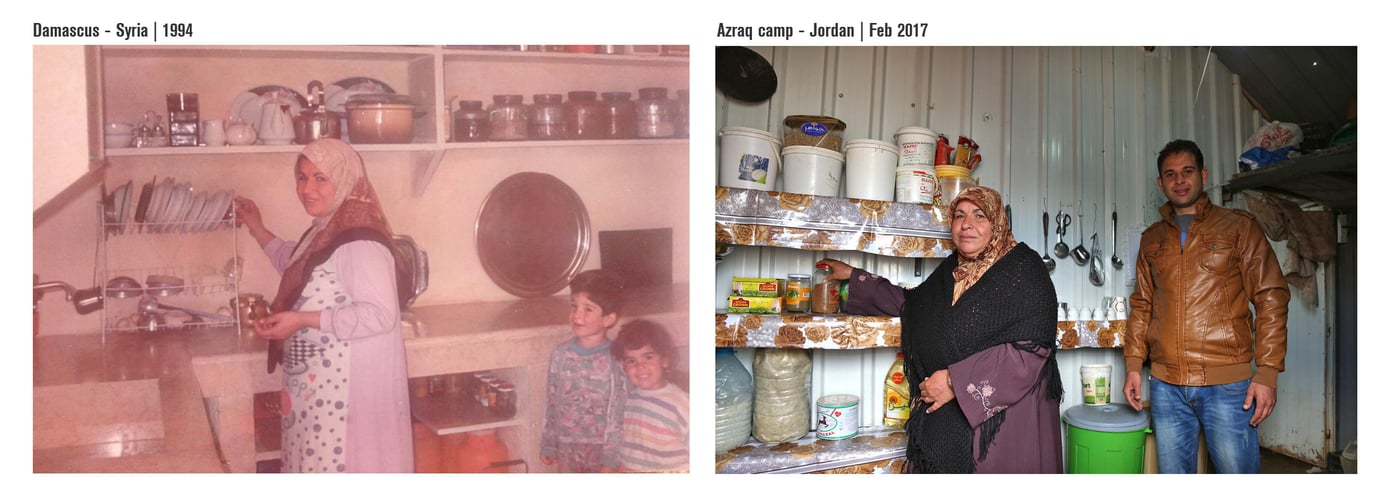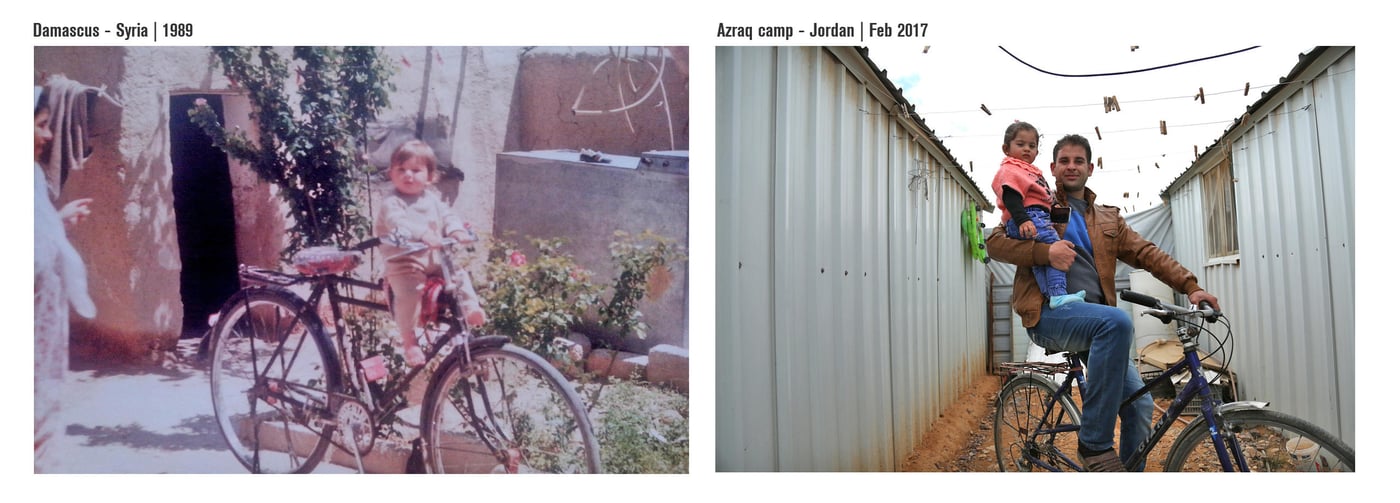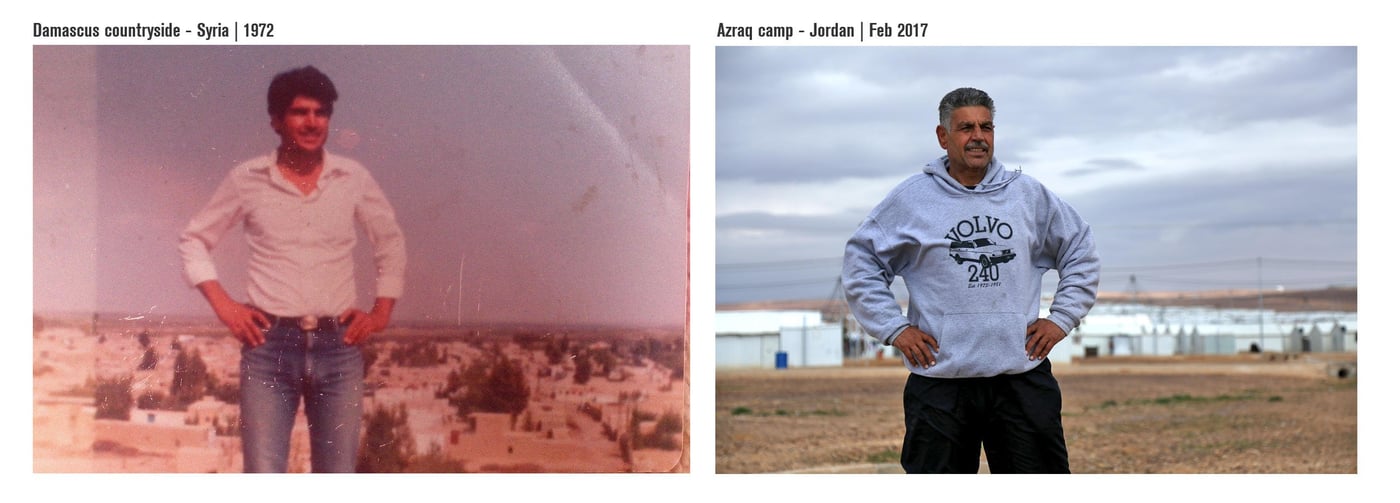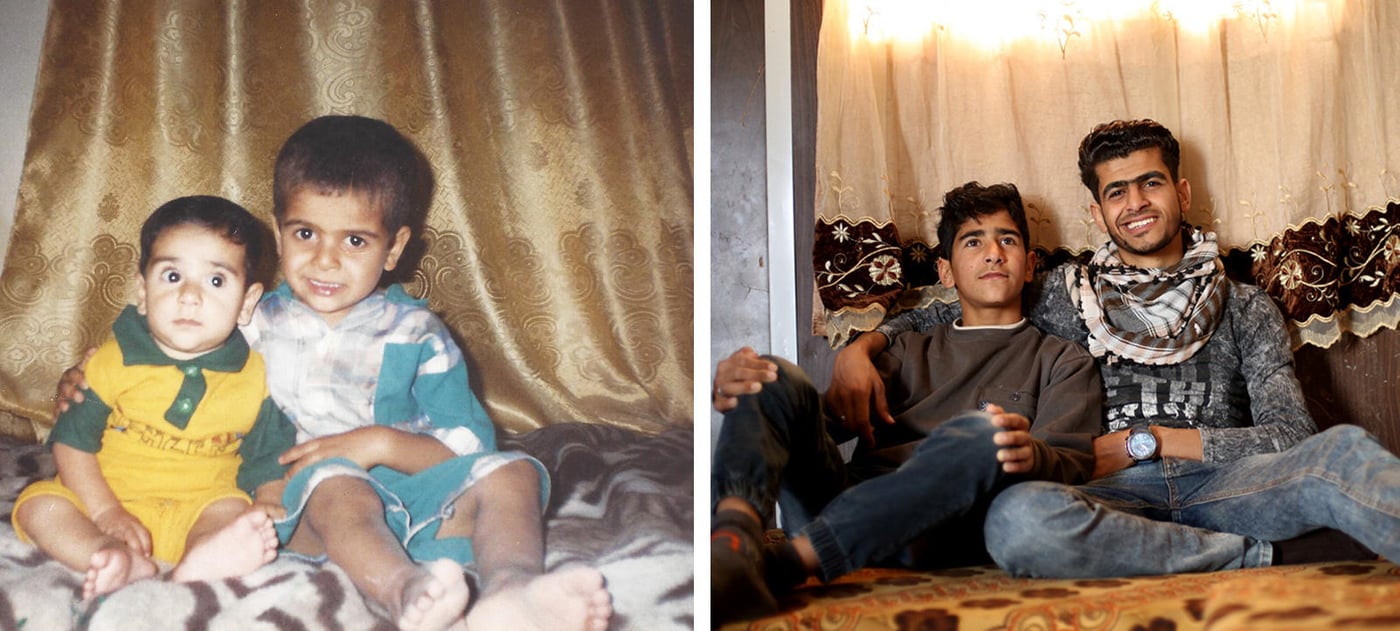Years have passed and as an employee with the Norwegian Refugee Council (NRC) I am now honoured to be working closely with Syrian refugees who fled their country. I decided to ask them about their memories, what they managed to bring with them. Or just the photographic images they kept in their minds and hearts.
Since its beginning in 2011, the Syria war has caused deaths, injuries, suffering and massive displacement. Many have lost their family members and belongings. Syrian refugees have carried with them their memories of how life used to be across borders to their forced exile. A few lucky ones also managed to quickly pack a few pictures they had taken over the years. Some were able to save them on memory sticks, while others are preserving their precious memories in their minds.
I visited three different families in Azraq and Zaatari camps in northern Jordan, who welcomed me to their temporary homes and were more than happy to share their stories.

Suad: When you adapt you live
On Valentine’s Day this year, I visited Obay’s family in their shelter in Azraq camp. Obay’s wife Rehab and mother Suad welcomed me warmly and prepared juice and famous Syrian sweets called ghraibeh. Suad, 57, was cooking lentils and rice, mjaddara, in her simple kitchen. I asked her if we could take a picture of her and Obay in the kitchen just like the one they took in 1994.
“Will I become a Hollywood star?” she said, laughing. “Why not, If you would call this a kitchen! In comparison to the kitchen I had before, this isn't a kitchen, but when you adapt you live."
When I showed Suad her picture from 1994 standing in the kitchen in her house in Damascus countryside, I asked her to tell me about what she remembered from that moment and what has changed since.
“I was 30, you know, young and beautiful with my two children,” she said, smiling.
“Obay was five and Sara was almost three, I cannot remember what they were doing, I think they were cracking jokes. Obay’s Dad took this picture of me. I was preparing some Turkish coffee. I think it was a weekend. Yes, it was a Friday – the kids are still in their pajamas.”
Her daughter Sara is not living with the family anymore, she travelled with her husband to Turkey.
“The family is scattered now,” said Suad, “I have two more daughters, one is married, she is living in Amman, I do not see her as often, and the third one lives here with me in the camp. My kitchen is not as equipped and I live in Azraq camp in Jordan not in Damascus, Syria. This is what has changed! As I said, when you adapt you live.”

Obay: Tomorrow will be more beautiful
On the same cold February day, the temperature was around zero. I visited Obay, a 28-year-old facilitator at the NRC education centre. He is from Damascus countryside but has been living in the Azraq camp for over three years now. Obay supports children with behavioural problems, who are aggressive or anti-social. He reinforces positive behaviours, generosity, leadership and sets them as standards for the students. He is married to Rehab, 26, who is from Dara’a and together they have a one-year old daughter named Hala. Hala was born in Azraq camp.
Obay’s shelter in Azraq is next to his parents’ and the narrow space between the two is used as a playground for Hala and for hanging the family’s clothes to dry. It also serves as a parking spot for Obay’s bicycle, which he uses to move inside the camp.
Once I entered Obay and Rehab’s shelter, they turned on the gas heater and we sat down together around it to chat. Obay had Hala’s picture hung above their bed. They had a chest of drawers for Rehab’s accessories and a small closet where they kept all their clothes. The single room shelter was lit by one central bulb.
I asked them about their memories and the pictures and Obay showed me over 20 pictures of himself, his family and his house as a child. When I asked Obay to choose his favourite photo, he picked one of himself on a bicycle in their back yard in rural Damascus.
I was really young. I don’t remember anything, I just remember that I used to love our backyard, and I was a happy child, always playing. We are no longer in Syria, we left our house, and it is destroyed.Obay, Syrian refugee in Jordan
I asked Obay to tell me how he feels when he looks at the picture, and what he thinks has changed over time.
“I was really young,” he told me, taking a deep breath. “I don’t remember anything, I just remember that I used to love our backyard, and I was a happy child, always playing. We are no longer in Syria, we left our house, and it is destroyed.”
In Azraq they only have a small space for Hala to play in.
"She has no other place to play because she may be put at risk. I was born and raised in Syria where we had a backyard to play in.”
While taking a photo of Obay and Hala on the bicycle, Obay whispered to me: "I love it when I see her smile. Tomorrow will be more beautiful."
Before I left their temporary dwelling, Rehab told me that she was pregnant with another girl.
“I decided I will call her Lian, like you. I hope she will be as sweet as you are,” Rehab said to me as a goodbye.

Ali: We used to sell perfumes and sunglasses
Entering Ali’s house in the Zaatari camp, we were talking about business and employment opportunities in the camp. The house consists of two prefabricated shelters, where his mother, brother and younger sister live. He wanted to show me the pictures his mother managed to bring from Syria. Around thirty in total and mostly digital, apart from those with Ali on them. We sat together and chatted about life in Zaatari.
Now 17 years old, Ali kept returning to the picture of himself sitting as a toddler on a chair wearing sunglasses.
“This was my Dad’s shop in rural Damascus where we used to sell perfumes and sunglasses.”
Ali’s father never came to Jordan and is still in Syria. Ali has not spoken to him for three years.
I asked Ali if we could take a picture of him sitting just like in the old picture he showed me and he laughed:
“Do you really want me to sit here, in front of the dry bread” pointing to the Arabic bread that the family has put on the sun to dry just behind the chair.
In Syria the family is all together but there’s no security. Here, we have no relatives but at least it’s safe.Ali, Syrian refugee in Jordan
I asked Ali to compare his life in the old picture and his life now.
“In Syria the family is all together but there’s no security. Here, we have no relatives but at least it’s safe.”
Ali told me has been in love with a girl he met in the camp, but she went back to Syria.
“I will keep waiting for her, hopefully we will meet again although I do not know where and when.”
Ali is determined to make sure that he can take care of a future bride.
“I keep applying for jobs in the camp, but they never get back to me.”

Abdelrahman: I was travelling from one country to another
“I was a pilot with the Syrian airlines. I received my education here in Jordan,” Abdelrahman told me as I walked into his shelter. He is 67 years old now living in the Azraq camp with his wife and daughter, next door to his married son Obay and his family. Having always made a point about keeping himself busy, Abdelrahman is working as an English teacher in Care international.
I showed Abdelrahman his picture from Obay’s phone, standing in front of his house in rural Damascus.
“Oh my! Look how young I was! That is in 1972, I was 18 years old, travelling from one country to another. Look at the greenery behind me and the villages!”
I asked Abdelrahman if I could take a picture of him in the camp and the same pose, he immediately liked the idea.
“Sure, but we won’t find anything green for the background.”
He looked behind him at the rows of shelters in the camp to compare to the view of his village on the original picture.
“Well, let’s at least have some of those shelters in the background, not the same but no big deal.”
Abdelrahaman laughed:
“Imagine where we are now, 35 years have passed.”


